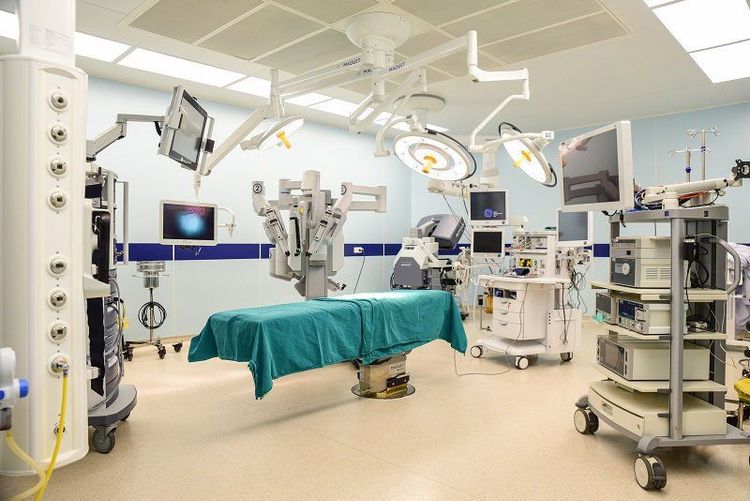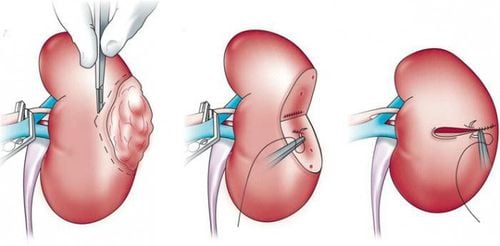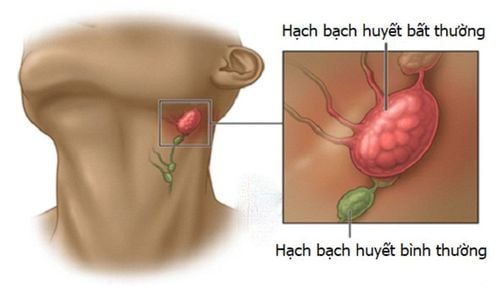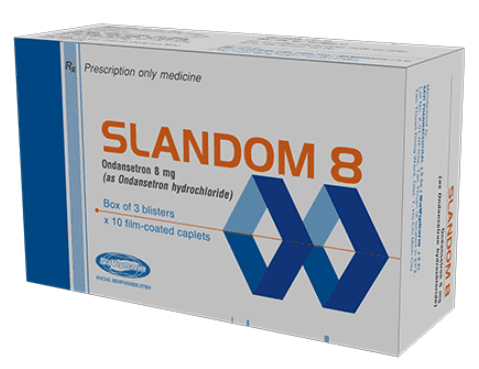This is an automatically translated article.
The article was written by a doctor of Internal Oncology - Radiation Oncology Center, Vinmec Times City International General Hospital.
Kidney cancer begins when healthy cells in one or both kidneys change and grow out of control, forming a mass called a cortical tumor. A tumor can be malignant or benign.
1. Surgery to treat kidney cancer
Surgery: helps to remove the tumor and some surrounding healthy tissue in one surgery. If the cancer has not spread beyond the kidney, surgery removes the tumor, part or all of the kidney, and possibly nearby tissues and lymph nodes.
Types of surgery used for kidney cancer include:
Radical nephrectomy : The goal is to remove the tumor, the entire kidney and surrounding tissue. If nearby tissue and surrounding lymph nodes are also affected by the disease, radical nephrectomy and lymph node dissection are performed in the same surgery. If the cancer has spread to the adrenal gland or nearby blood vessels, the surgeon may remove both the adrenal gland as well as parts of the blood vessels. Partial nephrectomy: This surgery removes only the tumor and part of the healthy tissue, but retains part of the kidney. This type of surgery is intended to preserve kidney function and reduce the risk of developing chronic kidney disease after surgery. Research has shown that partial nephrectomy is effective for small tumors (T1) Laparoscopic and robotic (minimally invasive surgery). In laparoscopic surgery, the surgeon makes several small incisions in the abdomen, instead of the larger incisions in traditional surgery. The surgeon will then insert the device through this small hole to completely remove the kidney or perform a partial nephrectomy. Sometimes, surgeons may use robotic instruments to perform surgery. This surgery may take longer but may be less painful.

Vinmec Times City là một trong các bệnh viện tại Việt Nam đầu tiên sử dụng phẫu thuật robot
2. Non-surgical tumor treatment
Sometimes surgery is not indicated because of the characteristics of the tumor or the patient's overall health. The following methods may be suggested instead:
Radiofrequency ablation (RFA) is the use of needles inserted into the tumor to destroy cancer with an electric current. The procedure is performed by an interventional radiologist or urologist. Patients only need local anesthesia. Cryoablation: Also known as cryotherapy or cryosurgery. The principle of this method is to freeze the cancer cells with a metal probe inserted through a small incision under the screen guided by ultrasound or CT/scan. The patient will be under general anesthesia for several hours and performed by an interventional radiologist. Drug therapy 2.1. Types of systemic therapy used for kidney cancer 2.2.1. Targeted therapy Targeted therapy is a treatment that targets specific genes, proteins, or tissue environments of the tumor - components that contribute to cancer cell growth and survival. This type of treatment stops the growth and spread of cancer cells while limiting damage to healthy cells. These drugs are becoming more and more important in the treatment of kidney cancer.
Antiangiogenic therapy This type of treatment focuses on stopping angiogenesis, which is the process of creating new blood vessels. Clear cell kidney cancer has a mutation in the VHL gene that causes the cancer to make too much of a certain protein, called vascular endothelial growth factor (VEGF), that controls the formation of new blood vessels. VEGF can be blocked with certain drugs. Because a tumor needs nutrients provided by blood vessels to grow and spread, the goal of antiangiogenic therapies is to starve the tumor. There are 2 ways to block VEGF.
One is an antibody called bevacizumab (Avastin), which has been shown to slow tumor growth for people with metastatic renal cell carcinoma.
Bevacizumab in combination with interferon slows the growth and spread of tumors. A similar drug called bevacizumab-awwb (Mvasi) has also been approved by the US Food and Drug Administration (FDA) to treat kidney cancer.
Another way to block VEGF is with tyrosine kinase inhibitors (TKIs). Axitinib (Inlyta), cabozantinib (Cabometyx), pazopanib (Votrient), sorafenib (Nexavar), and sunitinib (Sutent) are TKIs that can be used to treat clear cell kidney cancer. Side effects of TKIs can include diarrhea, high blood pressure, and pain and sensitivity in the hands and feet.
mTOR inhibitors: Everolimus (Afinitor) and temsirolimus (Torisel) are drugs that target a certain protein that helps kidney cancer cells grow, called mTOR. Studies show that these drugs slow the growth of kidney cancer.
Combination therapy In 2019, the FDA approved 2 combination treatments for advanced renal cell carcinoma:
- Combination of axitinib and pembrolizumab (Keytruda), an immune checkpoint inhibitor .
- Combination of 2 targeted therapies, axitinib and avelumab (Bavencio). Axitinib is an antiangiogenic therapy. Both pembrolizumab and avelumab target the PD-L1 protein in cancer cells. These treatment combinations work regardless of whether the tumor is expressing the PD-L1 protein, so people treated with this drug will not need a PD-L1 test.

Avastin được chứng minh là làm chậm sự phát triển khối u ở những người bị ung thư biểu mô tế bào thận di căn
2.2.2. Immunotherapy Immunotherapy, also known as biological therapy, is designed to increase the body's natural defenses to fight cancer. Scientists use materials made by the body or in a laboratory to improve, target, or restore immune system function.
Interleukin-2 (IL-2, Proleukin). IL-2 is a type of immunotherapy that has been used to treat advanced kidney cancer. This is a type of cytokine produced by white blood cells, which plays a very important role in immune system function, including the destruction of tumor cells. High doses of IL-2 can cause serious side effects, such as low blood pressure, kidney damage, heart attack, bleeding, chills, and fever. Patients may need to stay in the hospital for up to 10 days during treatment. However, some symptoms are reversible. Only centers with expertise in treating high-dose IL-2 for kidney cancer should recommend IL-2. High doses of IL-2 can cure a small percentage of patients with metastatic kidney cancer. Some centers use low-dose IL-2 because it has fewer side effects, even though it's not effective.
Alpha-interferon. Alpha-interferon is used to treat kidney cancer when the disease has spread. Interferon seems to change proteins on the surface of cancer cells and slow their growth. Although the drug has not been shown to be as beneficial as IL-2, alpha-interferon has been shown to prolong life when compared to an older treatment called megestrol acetate (Megace). Immune checkpoint inhibition. A form of immunotherapy that is currently of great interest, called immune checkpoint inhibitors, is also being tested in kidney cancer. The FDA has approved a combination of two immune checkpoint inhibitors, nivolumab (Opdivo) and ipilimumab (Yervoy), to treat certain patients with untreated advanced renal cell carcinoma. this. The FDA has also approved another inhibitor, pembrolizumab (Keytruda), for people with advanced renal cell carcinoma. A lot of research is being done on these drugs for the treatment of kidney cancer
2.2.3. Chemotherapy Chemotherapy is the use of drugs to kill cancer cells, usually by stopping the cancer cells' ability to grow and divide.
Although chemotherapy is useful to treat most types of cancer, kidney cancer is unfortunately often resistant to chemotherapy. Researchers continue to study new drugs and new combinations of drugs. For some patients, the combination of gemcitabine (Gemzar) with capecitabine (Xeloda) or fluorouracil (5-FU, Adrucil) temporarily shrinks a tumor.
It is important to remember that transitional cell carcinoma, also known as urothelial carcinoma, and Wilms tumor are more likely to be successfully treated with chemotherapy.
Side effects of chemotherapy depend on the individual and the dose used, but can include fatigue, risk of infection, nausea and vomiting, hair loss, loss of appetite and diarrhea. These side effects usually go away after treatment ends.

Hóa trị thường làm bệnh nhân mệt mỏi, nôn và buồn nôn
2.2.4. Radiation therapy Radiation therapy is the use of high-energy X-rays or other particles to destroy cancer cells. Radiation therapy is not effective as a primary treatment for kidney cancer. Very rarely, radiation therapy is used alone to treat kidney cancer because of the damage it causes to healthy kidneys. Radiation therapy is used only if the patient cannot have surgery and even then, usually only in areas where the cancer has spread and not on the primary kidney tumor. Usually, radiation therapy is used when the cancer has spread to help relieve symptoms, such as bone pain or brain metastases causing compression in the brain.
Currently, Vinmec International General Hospital applies all these techniques to treat patients.
Please dial HOTLINE for more information or register for an appointment HERE. Download MyVinmec app to make appointments faster and to manage your bookings easily.
Source Cancer.net 2019.












